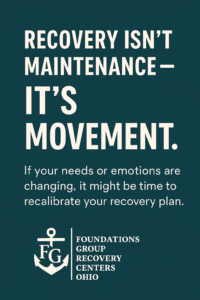Early recovery isn’t just about staying sober. It’s about building a life that you actually want to live. But if your plan still feels like it’s held together with duct tape and willpower, it might be time for a refresh.
Sobriety is the floor, not the ceiling. If you’ve been clean for a while but you’re starting to feel off, flat, or just “not right,” these red flags might explain why.
1. You’re white-knuckling it through most days
If staying sober feels like a full-time job, something’s off. It shouldn’t take every ounce of mental energy just to get through the day without drinking. That kind of tension isn’t sustainable—and it isn’t recovery.
What to try: It could be time to level up your support. A structured program like an intensive outpatient program (IOP), medication-assisted treatment, or trauma-informed therapy can help ease that internal battle.
2. You’ve outgrown your original support system
Maybe the group that carried you through early recovery isn’t working anymore. That’s not betrayal. That’s growth.
As your goals change, your community might need to shift too. If you’re not feeling seen or challenged by your current network, you’re allowed to seek out new voices, new mentors, and new peers.
Pro tip: Don’t wait until you’re totally isolated. Listen to that early discomfort. It’s wisdom, not weakness.
3. You’re doing “okay”… but you’re numb
Flatline isn’t freedom. Emotional numbness can be a subtle sign of burnout or depression. If you’re sober but feel like a shadow of yourself, don’t ignore it.
“I got sober to feel everything. So why do I feel nothing?”
— Outpatient Client, 2023
Recovery isn’t supposed to feel hollow. That numbness might mean you’re stuck in a phase of survival without having transitioned into deeper healing or purpose.
What to try: Creative therapy, deeper trauma work, or spirituality-focused recovery communities might help.
4. You’re hiding your struggles from your recovery friends
If you’re the one who always says, “I’m fine” while secretly feeling the opposite, you’re not alone. Many in long-term recovery fall into this trap—especially when they’ve been seen as “the strong one.”
Real recovery thrives on honesty. When we start hiding again, even from recovery peers, that’s a sign something needs adjusting.
What to try: Reach out to someone outside your usual circle. Consider speaking to a licensed counselor or exploring a new program with fresh dynamics. Foundations Group Recovery Centers offers alcohol addiction treatment in Columbus, OH for exactly these moments.
5. You’ve dropped the basics that used to help
Skipping therapy? Stopped journaling? Ghosting meetings? These are warning signs, not failures.
Recovery habits only work when we work them. If you’ve let go of the routines that made you feel grounded and supported, it’s time to check in.
Ask yourself: What used to help me feel connected, safe, or clear? What small steps can I bring back today?

6. Your plan runs on willpower instead of rhythm
If your recovery is powered mostly by grit and not by systems or support, you’re setting yourself up for burnout. Willpower is a muscle—and it gets tired.
Recovery thrives on rhythm, not resistance. The more your plan supports your daily life, the less you’ll need to fight yourself through every moment.
What to try: Rebuild structure. Add joy. Prioritize routines that energize you.
7. You’re fantasizing about “just one”
Let’s keep it real: relapse doesn’t start with the drink. It starts with the fantasy.
If you’re romanticizing a cold beer on a hot day, or wondering if you could drink “just socially” now that you’re doing better…that’s a red flag.
This doesn’t make you bad. It makes you human. But it also means your recovery plan may not be addressing your current emotional needs or stress load.
Time to adjust: Talk to someone before the thoughts get louder. Recovery evolves, and so should your tools.
Recovery Isn’t Maintenance. It’s Movement.
These red flags don’t mean you’re broken. They mean your needs are changing—and your plan needs to catch up.
At Foundations Group Recovery Centers in Columbus, we specialize in Alcohol Addiction Treatment in Ohio that helps people recalibrate when sobriety stops feeling like enough. Whether it’s reconnecting with purpose, treating underlying trauma, or finding a new rhythm, our alcohol addiction treatment options are built to meet you where you are.
Because freedom should feel like freedom.
Frequently Asked Questions About Updating Your Recovery Plan
How do I know if my recovery plan is outdated?
If you feel stuck, emotionally flat, or constantly exhausted by sobriety, it’s likely your recovery tools need an update. Warning signs include isolation, craving “just one,” and dropping the habits that once helped.
Is it normal to feel disconnected after a year sober?
Yes. Many people experience a dip in emotional connection or meaning after the early crisis of recovery has passed. This doesn’t mean you’re failing—it means it’s time to deepen or shift your approach.
Can I join a treatment program even if I haven’t relapsed?
Absolutely. You don’t have to hit rock bottom to get support. Foundations offers outpatient and group options for people who are sober but want more connection, clarity, or coping tools.
What kind of programs does Foundations offer?
We provide alcohol addiction treatment in Columbus including individual counseling, IOP (intensive outpatient), group therapy, trauma-focused care, and more. All programs are tailored to your current needs and sobriety goals.
I’m not sure I want to start over. Can I just tweak my plan?
Yes. Sometimes all you need is a tune-up, not a full restart. Talking to a recovery professional can help you identify small but powerful changes.
Ready to Feel Connected Again?
Your recovery deserves more than maintenance. Call (888) 501-5618 . We’re here to help you rediscover what your sobriety was always meant to give you: freedom that feels like freedom.
